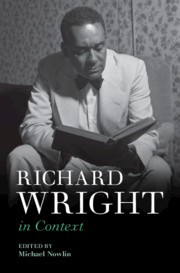Book contents
- Richard Wright in Context
- Richard Wright in Context
- Copyright page
- Contents
- Figures
- Contributors
- Abbreviations
- Richard Wright’s Works: A Chronology
- Introduction Richard Wright’s Luck
- Part I Life and Career, Times and Places
- Chapter 1 Richard Wright’s Triangulated South
- Chapter 2 Richard Wright’s Chicago
- Chapter 3 New York and Brooklyn
- Chapter 4 Paris and Ailly
- Chapter 5 Globetrotting, 1949–1960
- Part II Social and Cultural Contexts
- Part III Literary and Intellectual Contexts
- Part IV Reputation and Critical Reception
- Index
Chapter 4 - Paris and Ailly
from Part I - Life and Career, Times and Places
Published online by Cambridge University Press: 08 July 2021
- Richard Wright in Context
- Richard Wright in Context
- Copyright page
- Contents
- Figures
- Contributors
- Abbreviations
- Richard Wright’s Works: A Chronology
- Introduction Richard Wright’s Luck
- Part I Life and Career, Times and Places
- Chapter 1 Richard Wright’s Triangulated South
- Chapter 2 Richard Wright’s Chicago
- Chapter 3 New York and Brooklyn
- Chapter 4 Paris and Ailly
- Chapter 5 Globetrotting, 1949–1960
- Part II Social and Cultural Contexts
- Part III Literary and Intellectual Contexts
- Part IV Reputation and Critical Reception
- Index
Summary
Paris provided Wright with inspiration that could come only from his exiled status there as well as a diversity of contacts, encounters, cultural opportunities and political involvements that could be found nowhere else in the world. From his contacts with Jean-Paul Sartre, Albert Camus, Simone de Beauvoir, André Gide, and Frantz Fanon to his encounters with Chester Himes, James Baldwin, and Martin Luther King, Wright thrived on a dynamic assortment of collaborations. For Wright, his time in Paris (1947 until his death in 1960) and Ailly, a small farming town in East Normandy where Wright had a summer home (1955-1959) were for him instrumental in dealing with the racial terror he experienced in the United States. Paris and Ailly were places that aided his quest for self-discovery and deepened his relations with the global black diaspora. These locations allowed him to further engage with existentialism, Pan-Africanism, and Marxism while he experimented with such narrative modes as travel writing, literary journalism, and haiku. Perhaps most importantly, though, Paris was where Wright’s lifelong racial consciousness and globalist perspective were developed and confirmed.
- Type
- Chapter
- Information
- Richard Wright in Context , pp. 44 - 53Publisher: Cambridge University PressPrint publication year: 2021

